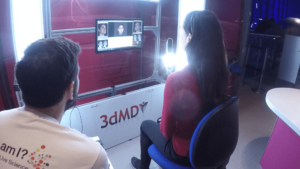3dMD is excited to be taking part in a fascinating experiment studying facial expressions in collaboration with researchers from Imperial College London as part of the Science Museum’s ongoing Live Science programme from 10 April 2017 – 2 July 2017 in London. During the experiment visitors are asked to make a range of facial expressions in front of the latest-generation dynamic-3D/4D 3dMDface.t System, which captures facial motion at 10 3D frames per second. When the researcher clicks the button, the 3dMD camera takes a progressive sequence of 3dMD photographs similar in concept to a video camera. The big difference with 3dMD is that in every video frame the subject is a 3D image with submillimetre shape precision, not a flat video sequence as shown in the movies. By taking part in the Live Science experiment, members of the public will be enabling scientists to gain a scientific understanding of facial movement and help improve current facial recognition technologies leading to benefits across society. Are your facial expressions unique?

10 April 2017 – 2 July 2017
Science Museum, London
sciencemuseum.org.uk/livescience
Live Science is an ongoing project where scientists are invited into the Science Museum to carry out research using Museum visitors as volunteers. This experiment builds on the ‘Me in 3D’ Live Science project held in the Science Museum in 2012 which created the largest database of 3D facial images in the world and drew in over 10,000 visitors over 3 months. Similarly, ‘Are your facial expressions unique?’ will provide a special opportunity for visitors to be a part of shaping future technologies.
About the Science Museum. As the home of human ingenuity, the Science Museum’s world-class collection forms an enduring record of scientific, technological and medical achievements from across the globe. Welcoming over 3 million visitors a year, the Museum aims to make sense of the science that shapes our lives, inspiring visitors with iconic objects, award-winning exhibitions and incredible stories of scientific achievement. More information can be found at sciencemuseum.org.uk.
